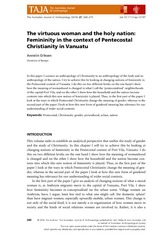| dc.contributor.author | Eriksen, Annelin | |
| dc.date.accessioned | 2016-12-30T13:39:33Z | |
| dc.date.available | 2016-12-30T13:39:33Z | |
| dc.date.issued | 2016-08 | |
| dc.Published | The Australian Journal of Anthropology 2016, 27(2):260-275 | eng |
| dc.identifier.issn | 1757-6547 | |
| dc.identifier.uri | https://hdl.handle.net/1956/15319 | |
| dc.description.abstract | In this paper I connect an anthropology of Christianity to an anthropology of the body and an anthropology of the nation. I try to achieve this by looking at changing notions of femininity in the Pentecostal context of Vanuatu. I do this on two different levels; on the one hand I show how the meaning of womanhood is changed in what I call the ‘pentecostalised’ neighborhoods of the capital Port Vila, and on the other I show how the household and the nation become contexts into which this new notion of femininity is played. Thus, in the first part of the paper I look at the ways in which Pentecostal Christianity change the meaning of gender, whereas in the second part of the paper I look at how this new form of gendered meaning has relevance for our understanding of wider social contexts. | en_US |
| dc.language.iso | eng | eng |
| dc.publisher | Wiley | eng |
| dc.rights | Attribution CC BY | eng |
| dc.rights.uri | http://creativecommons.org/licenses/by/4.0/ | eng |
| dc.subject | Pentecostal | eng |
| dc.subject | Christianity | eng |
| dc.subject | gender | eng |
| dc.subject | personhood | eng |
| dc.subject | urban | eng |
| dc.subject | nation | eng |
| dc.title | The virtuous woman and the holy nation: Femininity in the context of Pentecostal Christianity in Vanuatu | eng |
| dc.type | Peer reviewed | en_US |
| dc.type | Journal article | en_US |
| dc.date.updated | 2016-12-14T11:16:06Z | |
| dc.description.version | publishedVersion | |
| dc.rights.holder | Copyright 2016 The Author(s) | en_US |
| dc.identifier.doi | https://doi.org/10.1111/taja.12197 | |
| dc.identifier.cristin | 1378745 | |

